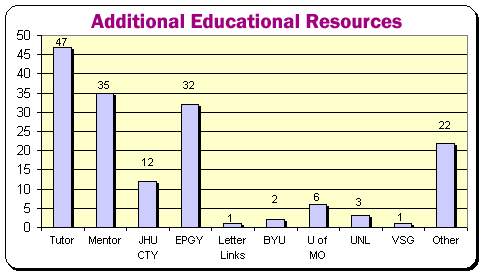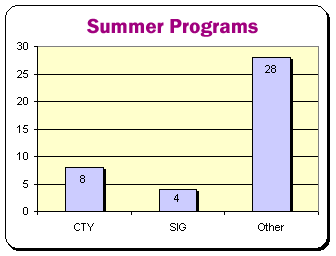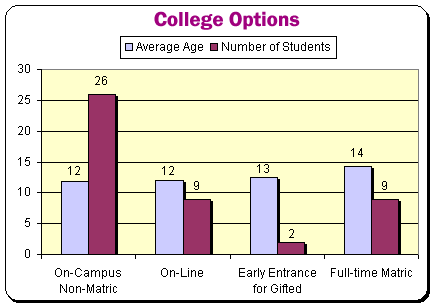
©2004
Mary Codd
all rights reserved
|
 |
Has
your child's education included any of the following?
[Tutors] [Mentors] [Distance
Learning] [Summer Programs] [College
Classes] |
|

|
|
Tutor(s)
In which subjects?
Forty-seven
children were working with at least one tutor. Subjects listed included:
Math (20), Foreign and/or Ancient Language (17), Music (14), Science
(8), Language Arts (8). Also
mentioned: physical education, and art
|
|
Mentor(s)
In which areas of interest?
Thirty-five
children were working with at least one mentor. Subjects listed
included: Science (10), Math (7), Music (8), Computers/programming
(4), Foreign or Ancient Language (3). Also
mentioned: photography, music, art, sewing, acting/drama, technical
theater, karate, history, religions, philosophy, social theory,
political science, culture, opera, storytelling, chess, and dance.
|
|
Distance
Education and Online Courses
Forty-two
children used distance education and/or online courses at least
once. Programs included: JHU CTY (12), EPGY(32), Letter Links (1),
BYU (2), U of MO (6), UNL (3), VSG (1), Other (22).
[Back
to Top]
|
| Summer
Programs |
 |
|
Thirty-one
children attended at least one summer program. They included: JHU
CTY (8), SIG (4), Other
(28).
[Back
to Top]
|
| College
Classes |
 |
College
Classes - On
campus, but as a non-matriculated student:
Twenty-six
children attended at least one college class on campus as a
non-matriculated student. Twenty-nine different colleges or
universities were mentioned. The average age of attendance was
12 for the first class on campus, with the youngest child being
7, and the oldest being 15. A wide range of classes were listed,
including:
Human
Anatomy and Physiology, Astronomy, Earth Science, Music Theory
and Composition, English, Critical Thinking, a few education
classes and 2-D computer Animation, Government 1 and 2, Composition
and Rhetoric 1 and 2, Psychology, Music Appreciation, Philosophy,
Economics, Adult Ed non-credit in astronomy, Computer Programming
Techniques, Writing, English: Creative Writing, English: Fiction;
English: 20 C. Women Writers, English: Poetry, English: Advanced
Poetry, African American Studies, Sociolinguistics, English:
Problems in the Interpretation of African American Poetry, English:
Fellows Seminar, Sociology: Race & Ethnic Studies, English:
Independent Study in Poetry, English: Experimental Writing,
Comparative Perspectives on Slavery, Race, and Emancipation,
German, Honors Astronomy, Honors Astronomy Lab, Honors Biology,
Calculus 1st semester, Physics, Zoology, College Writing, Mass
Media Writing, Advanced College Writing, Non-Calculus Physics,
Psychology, Sociology, Western Thought (philosophy), C++ programming,
Sociology, Literature, Communications, Drama, Game Theory, Multivariable
Calculus, Physics (Mechanics), Graph Theory, Hypergraphics -
audition, Advanced Linear Algebra, Analysis in a Single Variable,
Introduction to Programming Systems, Analysis III (Integration
Theory & Hilbert Space), Algorithms and Data Structures,
History, Scene Painting, Japanese, Biology 1 & 2, General
Chemistry 1, Honors General Chemistry 2, Intermediate Algebra,
Writing, Music, Pre-calculus, English: Introduction to Drama,
Calculus 2, and Elementary Music Theory.
Online
College Classes:
Nine
children took college classes on-line, with eight colleges or
universities mentioned. The average age of attendance was 12
for the first class on-line, with the youngest child being 8,
and the oldest being 16. A wide range of classes were listed,
including:
Pre-Algebra,
Pre-calculus, Calculus, Latin 1, Preparation for University
Writing, Linear Algebra; Multivariable Differential Calculus,
Algebra II, College Algebra and soon to take Trig, Genetics,
and Philosophy.
Special
early college entrance program specifically for gifted students:
Two
children started college fulltime at 10 and 15 years old with
early entrance programs for gifted students.
College,
as a fulltime matriculated student:
Nine
of the 109 students in this survey have started attending college
fulltime. The average age as a matriculating student is 14 ,
with the youngest child being 11, and the oldest being 17. (One
student's age was not noted.)
Eight
of the students have declared a majors, they include:
Biology, Political Science, Elementary Education, double major:
Math & Computer Science, History, Biology/Pre-Veterinary,
Physics and Math, and Engineering Science. The one that was
still undecided on a major said, "maybe Linguistics."
[Back
to Top]
|
|
Parent
comments regarding Additional Resources:
- The
University of Minnesota Talented Youth Mathematics Program (UMTYMP)
doesn't EXACTLY fit into any of the program categories above.
It is a specialized secondary math program for highly able middle-school-aged
students who test into the program and participate for up to five
years of highly accelerated instruction. The third, fourth, and
fifth year of UMTYMP provide college credit but this program is
part-time and thus not strictly an early-entrance program. More
information about the program can be found at http://www.itcep.umn.edu/umtymp/
- A
parent whose child has used tutors for Math, Science, Language
Arts, Spanish; EPGY for online courses; on campus college classes
in Astronomy, Earth Science, Music Theory and Comp.; and an online
college pre-algebra course said: "Well, I guess I don't actually
Homeschool him myself, but I do coordinate and manage his education."
- Has
attended college classes and lectures on occasional basis, not
as enrolled student. At age 10 audited 4 credit Asian Studies
course.
- Investigate
talent search programs and enrichment programs at an early age.
HG+ kids who are held in traditional education programs often
become bored and need experiences outside of school that will
hold their interest. Saturday enrichment programs may not address
their academic abilities, but will often come closer than what
they are doing in school, and will offer them the opportunity
to explore ideas/concepts not offered within the traditional academic
environment.
- Community
based education seems to work very well for highly gifted children.
Search the community for teachers, tutors, mentors, classes,lessons
and more. Dialogue with people about their understanding of gifted
children. Be courteous and willing to educate others. My 9 year
old son (now 10)wanted to take an honors Euclidean Geometry course
but the teacher was hesitant to take a student so young. I e-mailed
him and dialogued with him and he allowed my son to take it and
found out quickly that the younger students in the class were
very motivated and understood a great deal more than he thought
they would.
- We
afterschool in Japanese, French, and (additional) math. My daughter
spreads her afterschooling over all 7 days of the week, doing
2 subjects each day, with 1 on Saturday. This means she does Japanese
5 days, French 4 days, and math 4 days. A key for her has been
to offer a variety of tools for study. Each day she has a choice
based on her schedule and her mood. As a young child, classes
at the local science museum were a big interest for her. They
were the first ones to ask us if we were sure she was in the right
class - she seemed to know more than others. That was right before
she did her grade skip.
- She
will be starting Running Start next year. It is open to HS juniors
and seniors in WA state. It's a dual enrollment HS/college program
-- students can attend community colleges or a couple state universities.
The state/school district pays for the courses as long as the
student is under 18, needs more credits to graduate from HS, and
qualifies academically. There is NO lower limit age-wise. However,
the student needs to have HS credits that put them at junior HS
standing and be WA state residents. Families have to provide transportation
and purchase books, pay lab fees, etc. Ideally, the student graduates
from HS with an associate's degree as well. She'll be starting
at 13. Luckily, from other activities, she's familiar with the
campus.
- The
Uni of New South Wales (www.unsw.edu.au)
has an early entry program for gifted kids, but with no special
support offered once they enter. www.ola.edu.au
offers a full bachelor's degree and some postgraduate studies
online, with no entry requirements (including no age limits) or
pre-requisites whatsoever. It's been ideal to introduce my sons
to college level work. OLA will also take students from all over
the world.
- We
had difficulty with the Johns Hopkins summer program in LA; I
signed my son up for a class for which he has great enthusiasm,
Ancient Civilizations. He found out the other kids were there
because their parents made them go (prestige), and what's more,
it was right after the school year ended so they didn't want to
be there. Also, he already knew all about the topic! Moral?: think
about choosing a class in which you're not an expert. Community
college students in our area are not necessarily interested enough
in their classes to warrant our attendance there. My son's reason
for taking such classes would be to have discussions with other
people with a passion to know things (besides always me)! The
Laurel Springs program is very flexible for bright kids and I
highly recommend it. As opposed to the U.s of Nebraska and Missouri
and BYU, there's actually a teacher there who e-mails back and
forth with you to give you input. (Not just automated grading)
DS took several honors high school classes and enjoyed them. His
teacher adjusted her requirements for course completion when she
saw he didn't need to do all of it. Still searching for perfect
solutions.
- Our
child went to college as an Early Entry student, in a program
for high school students that have taken what their high school
has to offer in a subject and need more. (They must have a "B"
average in high school, or if homeschooled, have a good ACT OR
SAT score.) He took Chemistry in the Environment and Society at
10 yrs. (which they said was an exception), Calculus I and II
at 11 yrs., and he is currently in Calculus III at 12 yrs. (Only
through persistence did we get him in, as the admissions dept.
was not welcoming. The profs. were welcoming.) He also has taken
classes at the community college as a dual enrollment student.
They let high school students take classes after taking the CC's
assessment tests. There was some token protest at him being 11
or 12 yrs. (they say students should be 16), but it was not too
difficult to get him in anyway. The important part is having teachers
that are willing and/or glad to have him in class. At 12 yrs.
he has taken Intro to Biology, Microbiology, and is currently
in College Chemistry. I decided I did not want to reproduce science
labs at home when the CC has perfectly good equipment and he does
well there. I believe that when a child is ready for college level
material he should be allowed to try it. (It really lit up my
10 yr. old son's eyes.) Since we have nearby colleges, going in
person worked for us. He gets work done in a more timely manner
in classes he attends, than in UNL's ISHS (distance education),
which is self-paced and can be put off till tomorrow.
[Back
to Top]
|
|
|
|
|
|

